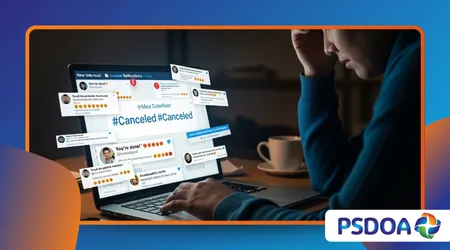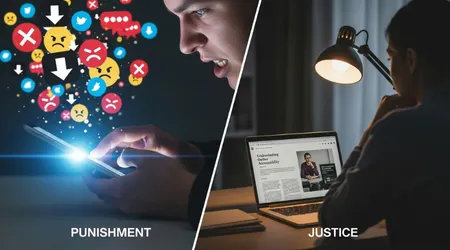The Psychology of Cancel Culture: Punishment vs. Justice

The Psychology of Cancel Culture is a fascinating, yet deeply unsettling, study in modern social dynamics, perpetually balancing between a sincere demand for accountability and the raw impulse for public punishment.
Anúncios
In 2025, this digital phenomenon continues to shape public discourse, demonstrating the power of decentralized collective action.
It forces us to ask: are these online movements delivering genuine justice, or merely facilitating a form of highly amplified social ostracization?
Examining this culture reveals a complex interplay of moral indignation, group identity, and the platform mechanics of social media.
The speed and severity of a “cancellation” often leave little room for due process, forgiveness, or meaningful reform, prioritizing immediate collective outrage over considered resolution.
Anúncios
What Drives the Desire for Collective Online Punishment?
At its core, the impulse to “cancel” is driven by deeply ingrained psychological mechanisms rooted in moral order and social control.
When an individual publicly violates a norm, the collective response the outrage serves to reaffirm the boundaries of the in-group. This public shaming is a digital descendant of historical practices, amplified exponentially.
The swiftness of judgment is fueled by what researchers term “moral grandstanding.” Individuals participate not purely out of moral conviction, but to publicly display their own superior virtue to their peer group.
This status-seeking behavior helps solidify one’s standing within a morally defined online community.
++ The FOMO Economy: How Fear of Missing Out Drives Consumption
The Mechanism of Moral Grandstanding and Status Seeking
Social media platforms are fundamentally designed to reward engagement, and few things generate more engagement than moral outrage.
Posting a furious denunciation of a “canceled” figure provides immediate positive reinforcement likes, shares, and agreement that boosts the user’s social capital. This quick payoff incentivizes a rapid, aggressive response.
This dynamic often results in a cycle of “piling on,” where the intensity of the attack escalates rapidly, not because the original transgression has grown, but because each participant is vying to demonstrate the purest moral commitment.
The focus shifts from the victim’s harm to the cancelers’ collective performance of righteousness, a critical element in understanding The Psychology of Cancel Culture.
Also read: Social Comparison in the Instagram Era: A New Age of Insecurity
Why Does Anonymous Aggression Feel Satisfying?
The disinhibition effect of online anonymity or semi-anonymity liberates users from the social consequences of real-world interactions.
People are far more likely to express extreme, vitriolic sentiments when shielded by a screen, resulting in disproportionate responses to perceived offenses. The absence of face-to-face accountability fuels the rage.
Furthermore, the act of participating in a cancellation provides a sense of collective empowerment, especially for marginalized groups who have historically lacked institutional power.
For them, the ability to mobilize quickly and demand consequences is a powerful, cathartic form of long-delayed social justice, rectifying deficiencies where traditional systems have failed.

How Does Social Contagion Amplify Online Outrage?
The virality of cancellation campaigns is not just about the severity of the offense; it’s a sociological phenomenon known as social contagion.
Just as emotions can spread rapidly in a crowd, moral outrage and the associated behavior demanding termination, boycott, or apology are easily transmitted through social network feeds.
This fast-spreading emotional resonance is a feature, not a bug, of platform algorithms that prioritize highly charged content.
Users who are exposed to a wave of collective anger are psychologically conditioned to join the chorus, fearing social isolation or even becoming a target themselves if they fail to signal agreement.
Read more: The Comfort of Rewatching the Same Show Over and Over
The Pursuit of “Perfect” Justice vs. Human Error
The problem arises when the emotional urgency of the online mob clashes with the messy reality of human fallibility.
Cancel culture often demands an impossibly “perfect” past from its targets. Any historical mistake, poor joke, or un-nuanced opinion is instantly recontextualized and judged by the standards of the present moment.
This unforgiving environment leaves no space for growth or genuine repentance.
The Psychology of Cancel Culture dictates that the accused is often presented as a one-dimensional villain, making it easier for the group to justify the severity of the subsequent punishment, ignoring any complexity or attempts at restitution.
The Analogy of the Digital Guillotine
We can draw an analogy to the Digital Guillotine. Historically, public shaming rituals, while harsh, were geographically limited and temporary.
The Digital Guillotine, however, executes a reputation permanently and globally.
Once the initial outrage subsides, the “canceled” person’s offense remains instantly accessible via search engines, a perpetual digital tattoo that hinders employment, relationships, and mental well-being for years.
The lasting nature of this online stigma demonstrates that the punishment the permanent reputational damage often far exceeds the goal of justice correcting a wrong or fostering accountability.
The lack of an institutionalized pathway for rehabilitation is the most damaging aspect of this phenomenon.
What Are the Psychological Ramifications for All Parties Involved?
The psychological fallout of cancel culture affects the canceled, the accusers, and even the bystanders who engage in self-censorship.
For the target, the sudden, extreme social rejection can lead to acute anxiety, depression, and social isolation, activating the same brain regions associated with physical pain, as demonstrated in neuro-psychology studies on social exclusion.
For the active participants, while the initial rush of moral validation is rewarding, the constant exposure to outrage and the pressure to maintain moral purity can be exhausting.
It fosters an environment of suspicion and emotional burnout, raising the question: does this form of “justice” make us happier or simply more anxious?
The Pervasive Threat of Self-Censorship
One of the most insidious effects of this culture is the widespread self-censorship it encourages among those watching from the sidelines.
A 2024 Pew Research study found that 49% of U.S. adults who use social media admit to having intentionally held back from posting political or social opinions for fear of online harassment or negative professional consequences.
This pervasive chilling effect diminishes honest and constructive public dialogue. When fear replaces genuine debate, critical thinking declines, and the very function of a free, open society is subtly undermined.
The psychological cost is not just borne by the canceled, but by the entire public sphere.
The Shift from Restorative Justice to Retribution
Genuine justice often aims for restoration repairing harm, facilitating learning, and welcoming the possibility of redemption.
Cancel culture, by contrast, overwhelmingly defaults to retribution, focusing solely on expelling the offender. The online sphere demands expulsion without a clear path for return.
The table below illustrates this critical psychological and moral misalignment:
| Psychological Goal | “Cancel Culture” Action | Justice System Principle |
| Outrage Expression | Public Shaming/Boycott | Due Process/Fact-Finding |
| Social Status Gain | Moral Grandstanding/Piling On | Impartiality/Objectivity |
| Final Outcome | Permanent Ostracization (Digital Scarlet Letter) | Rehabilitation/Reintegration |
| Emotional Driver | Collective Anger/Contempt | Atonement/Accountability |
The Psychology of Cancel Culture reflects both our noblest desire for accountability and our basest instincts for moralistic aggression.
While it has undoubtedly empowered marginalized voices and forced necessary reckonings with systemic issues, its execution often sacrifices genuine justice for immediate, disproportionate punishment.
As digital citizens in 2025, we must move toward demanding accountability that allows for human growth and redemption, rather than simply satisfying the algorithmic appetite for outrage.
Is it not time to foster a culture where sincere repentance is met with a pathway back, instead of a permanent banishment?
Share your thoughts below: What structural changes digital or social do we need to implement to shift the balance from pure punishment back toward restorative justice?
Frequently Asked Questions
Is “Cancel Culture” the same as a boycott?
No. A traditional boycott is a strategic economic refusal of a product or company.
“Cancel Culture” is a broader social phenomenon that often includes boycotting but primarily focuses on the instantaneous public shaming and professional ostracization of an individual, often with an emphasis on moral outrage and personal reputation damage.
What is the concept of “Context Collapse” in cancel culture?
Context collapse is a key psychological driver where a person’s words, originally shared within one specific social or professional context (e.g., a private joke, an academic discussion), are violently stripped of that context and re-shared with a new, broader audience (e.g., Twitter, TikTok).
This loss of original context ensures misinterpretation and amplifies outrage.
Can a “canceled” person ever genuinely recover their career?
Recovery is highly dependent on the severity of the offense, the sector, and the individual’s response.
While some high-profile figures successfully re-emerge after a period of self-reflection and genuine atonement, the vast majority of non-celebrity targets face significant, often permanent, professional barriers due to the lasting digital footprint of the cancellation event.
What is “Accountability Culture” and how does it differ from Cancel Culture?
“Accountability Culture” is the aspirational goal: a system where individuals are held responsible for harmful actions, required to repair the damage, and given a chance to learn and integrate back into the community.
“Cancel Culture” is the flawed mechanism, often characterized by performative outrage and a focus on expulsion rather than genuine behavioral change or restoration.
